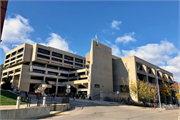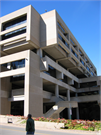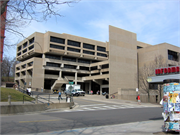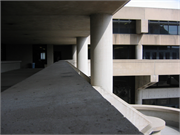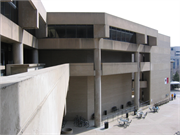| Additional Information: | A 'site file' exists for this property. It contains additional information such as correspondence, newspaper clippings, or historical information. It is a public record and may be viewed in person at the Wisconsin Historical Society, State Historic Preservation Office.
Helen C. White Hall is contributing to the Bascom Hill Historic District, NR listed 1974, NRIS #: 74000065
"seven-story Helen C. White Hall, a brick and concrete structure with gray-tone windows and two levels of underground parking. Helen White, professor of English who served the University for 48 years, published scholarly books on Tudor and Stuart religious literature, on the metaphysical poets, and on William Blake. A Renaissance woman in more than one sense, she served as a delegate to UNESCO and as president of the American Association of University Women. Built in 1971, and designed by Milwaukee architect Fitzhugh Scott, the building houses the College Library, School of Library and Information Studies, English, History of Science, and Philosophy." University of Wisconsin-Madison, University of Wisconsin-Madison Tour Guide, 1988.
City of Madison, Wisconsin Underrepresented Communities Historic Resource Survey Report:
Nellie Yvonne McKay was born in Queens, New York to Jamaican immigrants in 1931. She graduated with a bachelor’s degree in English from Queens College in 1969, a master’s degree from Harvard in 1971, and a Ph.D. from Harvard in American Literature in 1977. McKay was an assistant professor of American Literature at Simmons College and a visiting professor at MIT between 1973 and 1977. In 1978, McKay moved to Madison and took a faculty position at the University of Wisconsin specializing in African American literature. She was tenured in 1984 and worked throughout the 1980s expanding and popularizing the fields of African American literature, women’s studies, and multicultural women’s writing. Much of these disciplines owe their formation and identity to the seminal texts of her work.
Nellie McKay authored nine books in her career and is arguably best known as the co-editor, along with Henry Louis Gates, Jr., of the Norton Anthology of African American Literature, first published in 1996. The book has since become the standard for the field. She is also well known for her edited book Critical Essays on Toni Morrison, published in 1988, which contributed to Morrison winning the Nobel Prize in Literature. McKay also wrote more than sixty articles and essays on figures and writers such as Ida B. Wells, Zora Neale Hurston, and Alice Walker. Nellie McKay, who received many academic honors, taught and wrote until the time of her death in 2006. An annual lecture series at the university was established in her name.
The Department of Afro-American studies was established in 1970 following a series of successful student strikes demanding the creation of programs about African Americans and the hiring of African American faculty. The department has always focused on Black history, culture, and literature, but became increasingly popular and influential after the 1978 arrival of Nellie Yvonne McKay who took a faculty position at the University of Wisconsin specializing in African American literature. She was tenured in 1984 and worked throughout the 1980s expanding and popularizing the fields of African American literature, women’s studies, and multicultural women’s writing. Much of these disciplines owe their formation and identity to the seminal texts of her work.
McKay’s work aided in expanding and popularizing the Department of Afro-American Studies. Though she also taught in Women’s Studies and the English Department, her work on African American literature was influential. McKay, who received many academic honors, taught until the time of her death in 2006. An annual lecture series at the university was established in her name.
Nellie McKay was nationally significant in the African American community in the area of Education, specifically in the University of Wisconsin System, from 1978 to 2006. During this time, there were several resources associated with her: including her office at room 4220 in the Humanities Building at 455 North Park Street that she occupied from the late 1970s to 1989, the Department of Afro-American Studies located in Helen C. White Hall at 600 North Park Street, where she taught from 1978 to her retirement and occupied office number 6183 from 1989 to her retirement, her 1978 to 1987 residence at apartment #2 at 3213 Bluff Street, and her 1988 to 2006 residence at 2114 West Lawn Avenue. McKay’s office at the Humanities Building and her apartment were not included in the survey as the life of Nellie McKay and her significance in the area of Education were more closely associated with other resources. The primary resource associated with the life of Nellie McKay and her significance in the area of Education is Helen C. White Hall at 600 North Park Street. |
|---|

